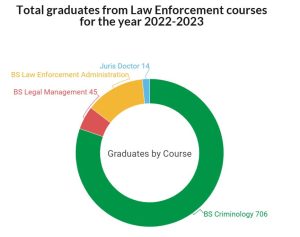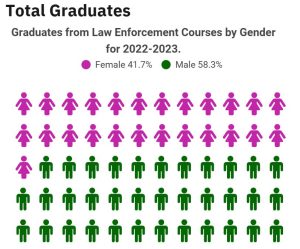Figure 1. Total Graduates from Law Enforcement and Related Course, School Year 2022-2023
Isabela State University once more produced 879 glocally competitive graduates from its various programs related to criminology and law in the School Year 2022-2023. The graduates are emanated from six (6) campuses of the University namely; Echague Campus (Main Campus), Jones Campus, Angadanan Campus, Cauayan Campus, Roxas Campus, and Cabagan Campus. The largest cohort came from the Bachelor of Science in Criminology, with 706 graduates, highlighting a significant interest in careers focused on crime prevention, law enforcement, security management, the correctional system, and the broader criminal justice system. The Bachelor of Science in Law Enforcement Administration had 114 graduates, emphasizing a commitment to the managerial aspects of policing and public safety. Additionally, 45 students completed the Bachelor of Science in Legal Management (track in Law), which prepares them for roles in legal firms and corporate environments. The Juris Doctor program, with 14 graduates, indicates a smaller, yet dedicated group aiming to pursue legal practice as attorneys.
These figures suggest a robust engagement with criminology and law fields at Isabela State University, reflecting current societal needs for skilled professionals in these areas. The predominance of graduates in criminology points to a growing recognition of the importance of crime-related studies, possibly driven by rising concerns over public safety and justice reform. Meanwhile, the presence of graduates in legal management and law enforcement administration indicates an evolving landscape where management skills are increasingly valued in law enforcement and legal contexts. Overall, this diverse range of graduates illustrates the university’s role in equipping students with the necessary skills and knowledge to meet the demands of various sectors within the criminal justice and legal systems.
From the graduate’s data, there were 23 graduates in the midyear term, 29 in the first semester, and a substantial 654 in the second semester for the Bachelor of Science in Criminology. This significant number in the second semester indicates that the majority of students likely completed their studies by the end of the academic year, showcasing the program’s popularity and successful retention of students.
However, there were no graduates in the midyear term, just 1 in the first semester, and 113 in the second semester for the Bachelor of Science in Law Enforcement Administration. This trend suggests that while the program may have fewer students overall, those who do enroll tend to graduate later in the academic year. The Bachelor of Science in Legal Management (Law) had no graduates in the midyear or first semester but saw 45 graduates in the second semester, while the Juris Doctor program had 14 graduates solely in the second semester, reflecting the program’s demanding nature and the commitment required from students.
Figure 2. Total Graduates from Law Enforcement and Related Course,
School Year 2022-2023 as to their Gender
The figure presents the gender profile of the graduates from the Law Enforcement-Related Course. The gender profile of graduates from law and enforcement-related courses at Isabela State University for the school year 2022-2023 shows 879 graduates, with 513 males and 366 females. This indicates that males represent approximately 58.3% of the graduating class, while females account for about 41.7%.
This gender distribution of graduates reflects broader trends in criminology and law enforcement, where traditionally, male students have constituted a larger portion of the population. However, the presence of 366 female graduates signifies an important step toward gender balance and inclusivity in these areas. The increasing number of women pursuing careers in law and enforcement demonstrates a shift in societal attitudes, as more females are seeking roles in fields that have historically been male-dominated.
The implication of this gender profile is significant for the future of law enforcement and legal professions. A diverse workforce can lead to a more comprehensive understanding of community needs and challenges, ultimately enhancing the effectiveness of law enforcement and the legal system. The growing number of female graduates can also inspire future generations of women to pursue similar paths, contributing to the ongoing efforts to promote equality and representation within these critical sectors. Overall, the gender profile highlights the progress made and the work still needed to achieve full gender parity in law enforcement-related careers.




